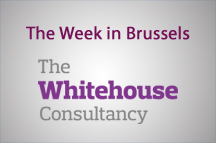 The European institutions had Tuesday and Wednesday off this week and many people apparently chose to take Monday or even the rest of the week off to make the most out of it. Yet those expecting a slow, crisis-free week were disappointed: the news agenda was filled with what was soon referred to on Twitter as #oettigate.
The European institutions had Tuesday and Wednesday off this week and many people apparently chose to take Monday or even the rest of the week off to make the most out of it. Yet those expecting a slow, crisis-free week were disappointed: the news agenda was filled with what was soon referred to on Twitter as #oettigate.
German Commissioner for the Digital Economy and Society Günther Oettinger found himself in hot water after making a number of inappropriate remarks in a speech in Hamburg on 27th October. The Commissioner, well known for going off message and for a propensity to use colourful language, referred to a Chinese delegation as “slant eyes” and joked that the German Government would be legislating to make gay marriage compulsory, while characterising the Belgian region of Wallonia as “a micro-state run by Communists”. He also made comments suggesting that many women only get their jobs because of quotas, rather than merit.
The timing could hardly have been worse. Oettinger had been tipped to replace outgoing Commission Vice-President Kristalina Georgieva, responsible for budget and human resources, who will be taking up a job at the World Bank. Such a move would be both a promotion for Oettinger and a symbolic gesture, as another German would be holding a senior position in the EU institutions.
His comments were roundly condemned by most political groups in the European Parliament (S&D, ALDE, ECR, Greens / EFA, GUE / NGL), with a notable absence by the EPP group, which represents the political party Oettinger belongs to. Also notable was the lack of comment by Commission President Jean-Claude Juncker, with the silence interpreted by some as a reluctance to criticise a German Commissioner belonging to Angela Merkel’s party. Oettinger first claimed that he had nothing to apologise for, but eventually issued an apology, noting that he was speaking “from the heart” or “light-heartedly” (frei von der Leber).
A deal broker
 Günther Oettinger is certainly an unusual specimen in the Eurobubble ecosystem. An influential politician in Germany, where he was Head of the state of Baden-Württemberg, his star appeared to be fading when he clashed with Angela Merkel on a number of issues. Some say this was the reason he was sent to Brussels, first as Energy Commissioner (2010-2014) and now Commissioner for Digital Economy and Society. Contrary to many of his peers, Oettinger spoke only German when he first arrived in Brussels and was not seen as an intellectual cosmopolitan. He had never lived outside Germany before his Brussels move.
Günther Oettinger is certainly an unusual specimen in the Eurobubble ecosystem. An influential politician in Germany, where he was Head of the state of Baden-Württemberg, his star appeared to be fading when he clashed with Angela Merkel on a number of issues. Some say this was the reason he was sent to Brussels, first as Energy Commissioner (2010-2014) and now Commissioner for Digital Economy and Society. Contrary to many of his peers, Oettinger spoke only German when he first arrived in Brussels and was not seen as an intellectual cosmopolitan. He had never lived outside Germany before his Brussels move.
He nevertheless managed to build a reputation as an effective deal broker and a supporter of established industries rather than a trailblazer for emerging sectors. His reputation for competency has certainly been an achievement, especially in his digital portfolio, an area he knew next to nothing about when he took up the role.
Will then his latest comments have any lasting effect on his career prospects? It seems that the balance of power is in his favour – German, belonging to the Christian Democrats (EPP group), apparently enjoying the support of President Juncker, with a reputation for effectiveness. Nevertheless, his comments have provoked a strong reaction in the European Parliament, which will be vetting him, if he is put forward as a candidate for Georgieva’s post. This might prove to be more of an uphill battle than expected.














